Francesca Donofrio Stamford mediator believes if anyone should be armed to disarm with words it may be these two gentlemen. Francesca Bambino Donofrio Stamford Mediator puts you to the task and challenge of offering your mediation suggestions. Try it!
(CNN) -- President Barack Obama held "close consultations" on Iran's nuclear program during talks with Israeli Prime Minister Benjamin Netanyahu on Wednesday during Obama's first visit to Israel as president.
Both countries have accused Iran of secretly working toward building a nuclear weapon, and Netanyahu has argued that a clear threat of military force is needed to convince the Islamic republic to stop.
Obama said there was still time for a diplomatic resolution to the situation, but added that each country has to make "the awesome decision to engage in any kind of military action" for itself.
"We prefer to resolve this diplomatically, and there's still time to do so," he said. "Iran's leaders must understand, however, that they must meet their international obligations."
Iran has rebuffed calls to halt its production of enriched uranium, saying it has a right to produce peacecful nuclear energy. But the International Atomic Energy Agency, the U.N. nuclear watchdog agency, has said it can no longer verify the peaceful nature of Iran's nuclear program.
Netanyahu said diplomacy and economic sanctions "have so far not stopped Iran's nuclear programs." And Obama added, "There is not a lot of daylight between our countries' assessments in terms of where Iran is right now."
The two leaders also discussed the stalled Middle East peace process and the ongoing civil war in Syria, where reports of the use of chemical weapons swirled this week.
During a joint news conference with Netanyahu, Obama repeated U.S. warnings to the Syrian government to keep those weapons off the battlefield or out of the hands of groups such as Syria's Lebanese ally Hezbollah, a sworn enemy of Israel.
Meanwhile, Palestinian activists erected a tent city Wednesday outside Jerusalem in the West Bank to protest Obama's visit and continued Israeli construction of settlements in what they consider an occupied territory.
Meanwhile, demonstrators in Gaza protesting Israeli and U.S. policies toward Palestinians burned flags of both nations as well as a picture of Obama.
After a morning meeting, both Obama and Israeli President Shimon Peres sought to alleviate any concerns among Israelis that the United States lacked the commitment or desire to support Israel on key issues.
"The state of Israel will have no greater friend than the United States" in seeking the mutual vision of giving the children of the Jewish state and other countries in the region "the opportunity for security and peace and prosperity," Obama said.
Peres raised topical issues, saying "we cannot allow" Hezbollah to get hold of Syria's chemical weapons because "it could lead to an epic tragedy."
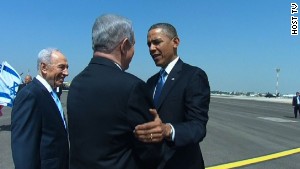
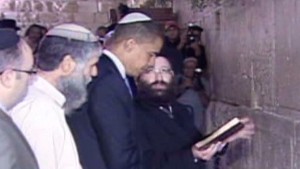
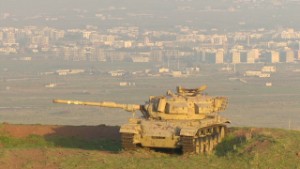
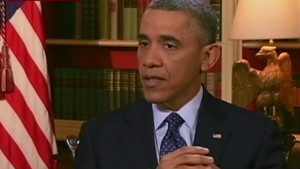
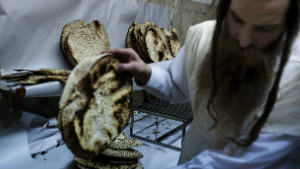
At the same time, Peres said he and Obama agreed that the "greatest danger" facing the Middle East was a nuclear Iran.
Earlier, Peres and Netanyahu greeted Obama at an arrival ceremony in Tel Aviv to launch Obama's trip, which also will include stops in the West Bank and Jordan.
"Across this region, the winds of change bring both promise and peril," Obama declared at the ceremony. "So I see this visit as an opportunity to reaffirm the unbreakable bond between our nations, to restate America's unwavering commitment to Israel's security, and to speak directly to Israel and to your neighbors."
In a quip to Netanyahu, Obama said, "It is nice to get away from Congress," reflecting the chronic political infighting in Washington.
The trip began as pressure built on his administration to increase support for the Syrian opposition in the civil war that started two years ago and has continued to escalate in recent months.
Poll: Most Americans say Israel is a friend
Israeli Justice Minister Tzipi Livni told CNN on Wednesday that "it is clear for us here in Israel" that chemical weapons have been used in Syria, and an international response to the crisis should be "on the table" in the talks later Wednesday between Obama and Netanyahu.
When pressed during an interview in her Tel Aviv home, Livni wouldn't say whether there was evidence that the regime of Syrian President Bashar al-Assad has directed the use of chemical weapons.
Obama has called the deployment of chemical weapons a "red line" for a more dramatic U.S. role in the Syrian conflict.
To Livni, the development poses a direct threat to Israel because "the appearance is that it's not going to be only in Syria, but that Hezbollah can reach all these chemical weapons and use them against Israel in the future."
Israelis have long been concerned that Hezbollah, Israel's foe in neighboring Lebanon, could gain possession of Syrian chemical weapons if the al-Assad regime is further destabilized.
Obama's first stop Wednesday was at an Iron Dome missile defense launcher in Tel Aviv.
Designed by Israel and funded by the United States, the battery was deployed at the height of November's fighting between Israel and Hamas. It intercepted a rocket headed for Tel Aviv, Israeli ambassador to the United States Michael Oren said.
Afterward, the president went to Jerusalem to meet separately with Peres and Netanyahu.
A shaky relationship
Obama's relationship with Netanyahu has never been warm, and the Israeli prime minister supported Republican challenger Mitt Romney -- a former business colleague -- in last year's presidential election.
In his first term, Obama got off to a rocky start with Netanyahu by pushing for a freeze on Israeli settlements, but his vocal support for the Israeli prime minister through the November crisis with Hamas and U.S. financial support for the Iron Dome anti-missile program could pave the road for greater trust in the relationship.
The Israeli-Palestinian dispute
White House officials said Obama was not bringing a new peace initiative and lacked optimism that enough solid ground existed to try to revive direct negotiations between Israel and the Palestinians over the declared goal of both sides for separate, neighboring states.
Most of all, the president's aides said, Obama wanted to assess how prepared -- if at all -- Netanyahu and Palestinian leader Mahmoud Abbas were to return to negotiations.
Palestinians want Obama to prove there were consequences for Israel's continued construction of new settlements in what they consider to be disputed areas.
Their grievances are evident in more personal ways: Posters on Ramallah streets sarcastically advise Obama not to bring his smartphone because Israel does not allow 3G or better service in the Palestinian territories.
Before meeting Peres on Wednesday, Obama and the Israeli president planted a magnolia tree descended from those at the White House to symbolize the deep roots of the relationship between their nations, the White House said.
The two leaders also were serenaded with the song "Tomorrow" by three young Israelis who dedicated it "from all the children who dream of peace."
